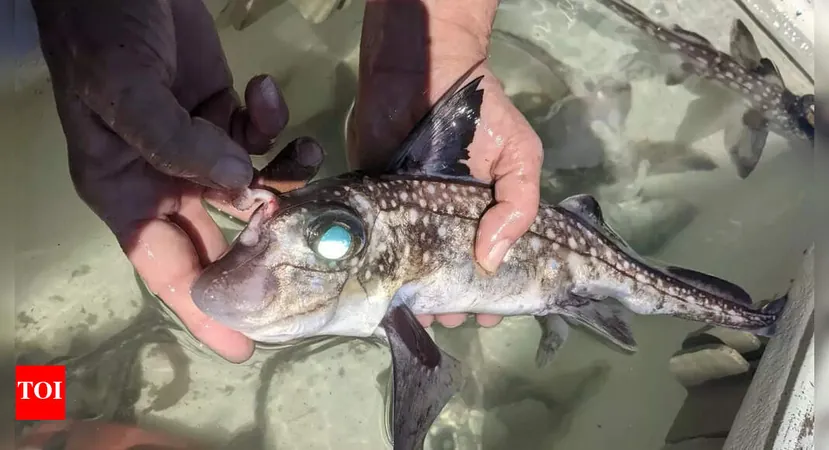
Unmasking 'Corporate Capture': The Hidden Threat to Environmental Protection
2025-09-10
Author: Rajesh
The Dark Side of Corporate Influence
For over 80 years, a troubling trend has emerged where powerful industries manipulate the institutions meant to regulate them, a phenomenon chillingly dubbed 'corporate capture.' From catastrophic oil spills to pharmaceutical cover-ups, history reveals the dire consequences of this insidious relationship between corporations and decision-makers—often detrimental to human and environmental health.
A Dire Warning from International Scientists
In a groundbreaking study led by Professor Alex Ford from the University of Portsmouth, international experts caution that unchecked corporate capture could significantly hinder global efforts to solve the intertwined crises of climate change, biodiversity loss, and chemical pollution. Published in "Environmental Science & Technology Letters," this research draws on insights from the International Panel on Chemical Pollution (IPCP), with Professor Ford being the first UK academic appointed to its board.
Tactics of Influence Revealed
Analyzing evidence across various industries—including tobacco, chemicals, fossil fuels, food, pharmaceuticals, and even media—the study reveals a disturbing tactics playbook illustrating how industries orchestrate their influence over critical decisions. This manipulation can lead to regulatory standards being relaxed, harmful products remaining on the market, and crucial research being suppressed, all in the name of profit.
Real-World Consequences: A Web of Influence
Professor Ford notes, "Those charged with protecting society and the planet often find themselves ensnared in a web of influence, whether knowingly or not. Funding, data, and decision-making can be subtly guided by vested interests. These corporate capture strategies are frequently systemic and ingrained, underscoring the need for recognition and action." This phenomenon has persisted since the 1940s, with regulators and scientists frequently prioritizing corporate interests over public welfare.
Beyond Regulators: The Widespread Impact
The implications of corporate capture extend beyond regulatory bodies. The paper argues that universities, NGOs, cultural institutions, and intergovernmental panels must also be scrutinized for potential conflicts of interest. For instance, partnerships between academic institutions and the fossil fuel industry—coined 'Frackademia'—have drawn significant scrutiny, as have museums accepting sponsorships from oil companies. Other problematic instances include pesticide companies funding scientific conferences and Hollywood’s historical ties to the tobacco industry.
The Case for Transparency
While the study highlights troubling examples of corporate influence, it acknowledges that not all industry partnerships are detrimental. Co-author Dr. Maria Clara Starling emphasizes that the private sector has significantly contributed to technological advancements and environmental efforts. However, she insists, "Industry involvement must remain transparent, accountable, and free from conflicting interests that could jeopardize public and environmental health."
A Call to Action for Stronger Policies
IPCP board members are demanding robust conflict of interest policies, enhanced funding transparency, and improved governance within institutions. They recommend training university students to recognize disinformation and tactics employed by industries, particularly in environmental sciences. Professor Ford’s ongoing exploration of the intersection between science, influence, and policy raises crucial points, as he previously investigated how England’s water sector strategically diverts attention from sewage pollution.
Navigating the Conflict of Interest
Ultimately, Professor Ford cautions, "The aim isn’t to demonize industry—many companies are actively advancing sustainability. It’s essential to cultivate an awareness of how some sectors may resist positive change. Commercial interests don’t always coincide with public or planetary health, and we require the tools to comprehend and navigate this complex landscape."




 Brasil (PT)
Brasil (PT)
 Canada (EN)
Canada (EN)
 Chile (ES)
Chile (ES)
 Česko (CS)
Česko (CS)
 대한민국 (KO)
대한민국 (KO)
 España (ES)
España (ES)
 France (FR)
France (FR)
 Hong Kong (EN)
Hong Kong (EN)
 Italia (IT)
Italia (IT)
 日本 (JA)
日本 (JA)
 Magyarország (HU)
Magyarország (HU)
 Norge (NO)
Norge (NO)
 Polska (PL)
Polska (PL)
 Schweiz (DE)
Schweiz (DE)
 Singapore (EN)
Singapore (EN)
 Sverige (SV)
Sverige (SV)
 Suomi (FI)
Suomi (FI)
 Türkiye (TR)
Türkiye (TR)
 الإمارات العربية المتحدة (AR)
الإمارات العربية المتحدة (AR)